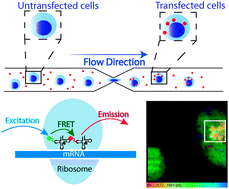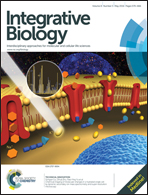Monitoring protein synthesis in single live cancer cells†
Abstract
Protein synthesis is generally under sophisticated and dynamic regulation to meet the ever-changing demands of a cell. Global up or down-regulation of protein synthesis and the shift of protein synthesis location (as shown, for example, during cellular stress or viral infection) are recognized as cellular responses to environmental changes such as nutrient/oxygen deprivation or to alterations such as pathological mutations in cancer cells. Monitoring protein synthesis in single live cells can be a powerful tool for cancer research. Here we employed a microfluidic platform to perform high throughput delivery of fluorescent labeled tRNAs into multiple myeloma cells with high transfection efficiency (∼45%) and high viability (>80%). We show that the delivered tRNAs were actively recruited to the ER for protein synthesis and that treatment with puromycin effectively disrupted this process. Interestingly, we observed the scattered distribution of tRNAs in cells undergoing mitosis, which has not been previously reported. Fluorescence lifetime analysis detected extensive FRET signals generated from tRNAs labeled as FRET pairs, further confirming that the delivered tRNAs were used by active ribosomes for protein translation. Our work demonstrates that the microfluidic delivery of FRET labeled tRNAs into living cancer cells can provide new insights into basic cancer metabolism and has the potential to serve as a platform for drug screening, diagnostics, or personalized medication.


 Please wait while we load your content...
Please wait while we load your content...